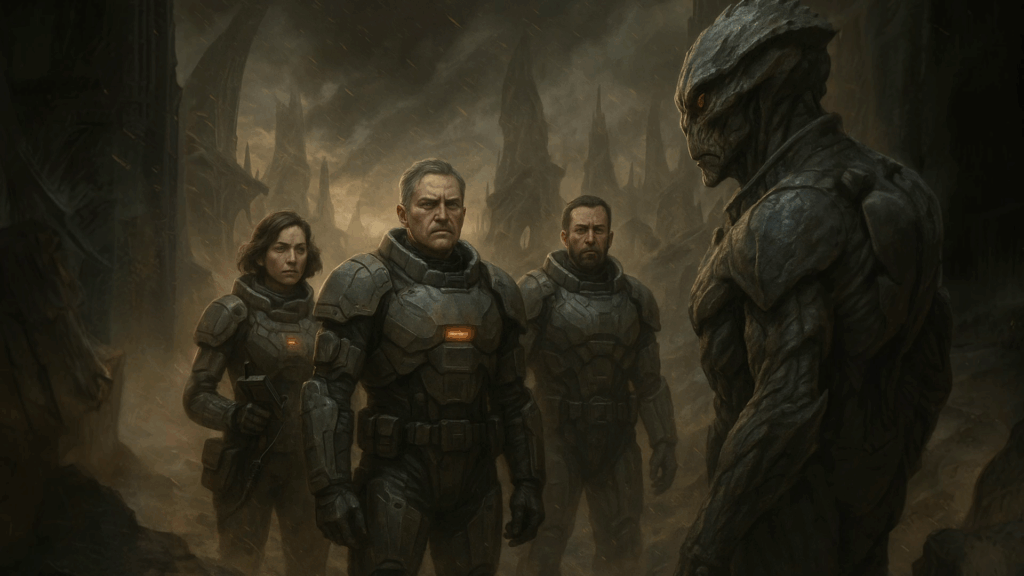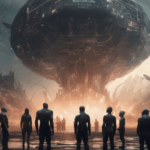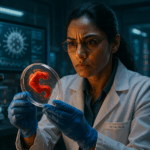The Galactic Conclave had always viewed humans as a curiosity-a species that somehow survived on a planet that, by all reasonable standards, should have been uninhabitable. Earth, with its crushing gravity, extreme temperature variations, toxic oxygen atmosphere, and constant natural disasters, was classified as a Class-5 Deathworld. No other sentient species in known space had evolved under such brutal conditions.
When Ambassador Elijah Okonkwo led his diplomatic team to the Zith’ari homeworld for what was supposed to be a routine treaty negotiation, he never expected betrayal. But as alarms blared and the embassy locked down around them, he realized they had severely misjudged the situation.
“They’ve cut off all communications,” Dr. Sophia Reyes reported, her dark eyes scanning the emergency protocols on her tablet. “And the atmospheric regulators are shutting down.”
Elijah’s military instincts, carefully hidden beneath years of diplomatic training, immediately kicked in. “They think they’re going to suffocate us,” he said quietly. “They don’t understand what we are.”
High Commander Vex’lar watched through surveillance feeds as the human delegation was sealed in their quarters. According to all intelligence, the fragile mammals would succumb to Zith’ari atmospheric conditions within hours. Their deaths would be regrettable but necessary to prevent Earth from gaining the strategic advantage in the sector.
What Vex’lar couldn’t possibly understand was that humans didn’t evolve to surrender. They evolved to survive.
The Promise Broken
The diplomatic compound shuddered as external locks engaged, sealing the human delegation inside what was intended to be their tomb. Ambassador Elijah Okonkwo maintained his composure, though his mind raced with military calculations-old habits from his classified past in Earth’s Special Forces.
“Everyone gather around,” he commanded, his deep voice steady despite the crisis. “This is no accident. The Zith’ari have decided we’re more valuable as hostages-or corpses.”
Dr. Sophia Reyes, the team’s xenobiologist, was already analyzing the changing atmosphere. “They’re reducing oxygen levels and introducing methane compounds. For most species in the Conclave, this would be lethal within minutes.”
“But not for us,” said Communications Officer Takashi Yamamoto, a wry smile forming on his face.
“Precisely,” Sophia confirmed. “Earth’s oxygen levels have fluctuated dramatically throughout our evolutionary history. We can adapt to lower concentrations than most species realize.”
Security Chief Maya Hernandez was checking the structural integrity of their prison. “The gravity generators are being adjusted too. They’re increasing it by about 20%.”
A laugh escaped Elijah’s lips. “They think that will incapacitate us? Earth’s gravity is already 30% stronger than the Conclave standard.”
The six-person team gathered in the central chamber of their quarters as the lights flickered and dimmed. Outside, High Commander Vex’lar and his security council watched the surveillance feeds, expecting to see panic, then collapse, then death.
Instead, they witnessed something incomprehensible: the humans were smiling.
“Let me guess the plan,” said Dr. Reyes, her scientific mind already mapping possibilities. “They’ll wait until we’re unconscious, then either use us as bargaining chips or stage our ‘accidental’ deaths.”
Elijah nodded. “Which gives us an advantage. They don’t expect us to remain conscious, let alone functional. We need to use that misconception.”
As the room temperature began to drop precipitously, the team huddled closer. The Zith’ari were throwing everything at them-atmospheric changes, gravity increases, and now temperature manipulation.
“They’re getting creative,” Maya observed, her breath now visible in the rapidly cooling air. “But they forget-humans evolved through ice ages.”
Elijah looked at each member of his team, seeing not fear but determination in their eyes. “They’ve made a critical error. They’ve trapped themselves in a diplomatic compound with creatures from a deathworld, and they have no idea what we’re capable of.”
On the other side of the surveillance feed, High Commander Vex’lar’s mandibles clicked in satisfaction as he watched the humans huddle together-a clear sign of distress among most species. Soon they would be unconscious, and the next phase of his plan could begin.
He had no way of knowing that what he interpreted as a survival huddle was actually a war council.
Progress Through Pain
Three days into their captivity, the Zith’ari security council was in disarray. The humans should have perished within hours, yet surveillance showed them not only surviving but seemingly adapting to conditions that would kill any other Conclave species.
“Impossible,” hissed Sub-Commander Zex’til, his scales flushing with agitation. “We’ve reduced oxygen to 10%, increased radiation levels, and dropped the temperature to near freezing. How are they still functioning?”
High Commander Vex’lar studied the monitors with growing unease. The humans moved more slowly in the increased gravity, but they moved nonetheless. They’d torn apart furniture to create insulated shelters against the cold. Most disturbing of all, they appeared to be systematically testing the structural weaknesses of their prison.
“We severely underestimated them,” Vex’lar admitted. “The intelligence reports classified humans as soft-bodied, endothermic mammals with no natural defenses.”
“Then explain this,” demanded Zex’til, pointing to a screen where the human security officer was performing strength exercises despite the crushing gravity.
Inside their prison, the diplomatic team was turning disadvantage into opportunity. Dr. Sophia Reyes had become their survival specialist, applying her knowledge of comparative xenobiology to their situation.
“The radiation they’re pumping in is nothing compared to what astronauts endured during early space exploration,” she explained while checking everyone’s vitals. “And the cold? Please. Humans have lived in Antarctic research stations for centuries.”
Ambassador Okonkwo had shed his diplomatic persona entirely, revealing the hardened tactical mind that had once made him a legendary Special Forces commander. “They’re getting desperate. The atmospheric composition changed again last night.”
“I noticed,” Sophia said. “They’ve introduced trace amounts of hydrogen sulfide-highly toxic to most Conclave species.”
Elijah smiled grimly. “But Earth’s volcanic regions are full of it. Our bodies know how to process small amounts.”
Communications Officer Yamamoto had repurposed parts from their supposedly disabled equipment. “I’ve almost got our internal comms working. Once we can coordinate without them overhearing, we can move to phase two.”
The team had discovered something the Zith’ari never considered-the environmental systems designed to kill them could be manipulated. The cooling system’s condensation provided drinking water. The increased gravity strengthened their muscles daily. Even the radiation had an unexpected benefit-it interfered with some of the more sensitive surveillance equipment.
Meanwhile, Dr. Reyes made another critical discovery. “The Zith’ari atmosphere contains compounds similar to Earth’s Mesozoic period. Our bodies are struggling, but adapting-while to them, our Earth-normal environment would be immediately fatal.”
Elijah absorbed this information with a tactician’s mind. “So if we can access the environmental controls…”
“We could turn this entire facility into a death trap-for them,” Sophia finished.
On the seventh day, the Zith’ari council received alarming news. The monitoring systems showed the humans were no longer just surviving-they were thriving. They’d adapted to conditions meant to exterminate them, and worse, they’d begun dismantling internal systems with alarming efficiency.
High Commander Vex’lar felt true fear for the first time in his long career. “Increase security at all access points to the human containment area. No one enters without my direct authorization.”
“But Commander,” protested his security chief, “we need to check the internal systems. They’ve somehow disabled three monitoring stations.”
“No,” Vex’lar’s voice was firm. “I’m beginning to understand what we’re dealing with. These aren’t diplomats-they’re deathworlders. And we’ve just locked ourselves in with them.”
That night, as the Zith’ari doubled their guards, the humans made their move. They had spent a week adapting, strengthening, and planning. Now, they were ready to show their captors exactly what creatures from a Class-5 Deathworld could do when cornered.
The Hunters Become the Hunted
The Zith’ari guards never stood a chance. They had been trained to subdue conventional threats-not humans operating in environmental conditions that would incapacitate any other species.
Security Chief Maya Hernandez moved through the darkened corridors like a predator, her muscles strengthened by days in high gravity. Behind her, Communications Officer Yamamoto had repurposed their equipment into crude but effective weapons.
“Remember,” Ambassador Okonkwo had instructed before they breached their prison, “we’re not here for revenge. Our mission remains diplomatic-we’re just changing the terms of negotiation.”
The team split into three groups. Maya and Takashi would secure an escape route. Dr. Reyes and Science Attach? Chen would access the environmental controls. Elijah and Cultural Liaison Patel would head for the command center-and High Commander Vex’lar.
The Zith’ari security systems, sophisticated as they were, had a critical weakness: they were designed to contain species with specific biological limitations. The designers never considered a species that could function in multiple hostile environments.
Dr. Reyes and Chen reached the environmental control center first. Two guards collapsed immediately when Sophia deployed a canister of Earth-normal air-the oxygen concentration toxic to Zith’ari physiology.
“Fascinating,” she murmured, stepping over their unconscious forms. “Their respiratory systems are completely overwhelmed by what we consider normal.”
Chen was already at the controls. “I can access the whole facility from here. What settings do you want?”
Sophia’s eyes gleamed with scientific precision. “Make it Earth-normal in the corridors our team will use. For everywhere else, increase oxygen by 5% every thirty minutes. Not enough to kill, but enough to disorient.”
In the security hub, Maya and Takashi encountered more resistance but used the Zith’ari’s assumptions against them. The guards, expecting weakened prisoners, were unprepared for humans operating at near-peak efficiency.
“They really should have researched Earth’s military history,” Maya commented, securing the last guard with restraints fashioned from equipment cables. “Humans specialize in adaptation and asymmetric warfare.”
Takashi had already hacked into the communication systems. “I’ve got facility-wide access. Patching through to the Ambassador now.”
Ambassador Okonkwo and Patel had the most dangerous mission-confronting High Commander Vex’lar directly. As they approached the command center, they encountered a squad of elite guards armed with stun weapons.
Elijah stepped forward, his diplomatic posture completely gone, replaced by the bearing of a veteran soldier. “Those weapons were calibrated for standard Conclave physiologies,” he called out. “Our nervous systems are structured differently. You’ll need three times the charge to incapacitate a human.”
The guards hesitated-just long enough for the environmental changes Dr. Reyes had implemented to take effect. As oxygen levels rose, the Zith’ari began to show signs of disorientation.
“You can fight and lose,” Elijah continued, “or you can stand down and live. Either way, we’re seeing the High Commander.”
Inside the command center, High Commander Vex’lar received the reports with growing horror. In less than an hour, the humans had escaped their prison, neutralized his security forces, and taken control of critical systems. Now they were coming for him.
When the doors to the command center slid open, Vex’lar was alone, his staff having succumbed to the changing atmospheric conditions.
Ambassador Okonkwo entered first, once again the picture of diplomatic composure-except for the improvised weapon at his side.
“High Commander,” he said formally. “I believe it’s time we renegotiated the terms of our relationship.”
A New Understanding
The Galactic Conclave emergency session was called just three standard days after what was now being referred to as “The Zith’ari Incident.” Representatives from all twenty-seven member species gathered in the great chamber, an atmosphere of tension and disbelief permeating the proceedings.
Ambassador Elijah Okonkwo stood at the central podium, his diplomatic team arrayed behind him. Across the chamber, High Commander Vex’lar and the Zith’ari delegation sat in uncharacteristic silence.
“Esteemed representatives,” Elijah began, his voice carrying the weight of recent events, “I stand before you not to demand retribution, but to offer understanding. What happened on the Zith’ari homeworld was the result of a fundamental misconception about human physiology and capabilities.”
Murmurs spread through the assembly. Most species had received only fragmented reports of how six unarmed humans had effectively taken control of a secure Zith’ari facility.
“For too long, the Conclave has classified Earth as an anomaly-a deathworld that somehow produced sentient life. You’ve viewed our environmental adaptations as curiosities rather than essential aspects of who we are as a species.”
Dr. Sophia Reyes stepped forward, activating a holographic display. “These are comparative physiological readings,” she explained. “What you’re seeing is how the average human body responds to conditions that would be lethal for most Conclave species.”
The data scrolled through: extreme temperature tolerance, radiation resistance, atmospheric adaptability, high-gravity functionality, and perhaps most shocking to the assembly-recovery rates from traumatic injury.
“Humans didn’t evolve in a protected environment,” Sophia continued. “We evolved in a world that tried to kill us at every turn. Our planet has experienced five mass extinction events, yet our ancestors survived them all. We’ve endured ice ages, supervolcanoes, meteor impacts, and pandemic diseases.”
Ambassador Okonkwo reclaimed the podium. “The Zith’ari made a critical error in judgment. They assumed that because we appear physically similar to other mammalian species in the Conclave, we share the same limitations. We do not.”
High Commander Vex’lar rose slowly from his seat, his normally iridescent scales dulled with stress. The assembly fell silent-it was unprecedented for the accused to speak before formal charges were presented.
“The human ambassador speaks truth,” Vex’lar’s translator conveyed. “We gravely misjudged what we were dealing with. Our intelligence suggested that humans were fragile beings requiring constant environmental support. We were… catastrophically incorrect.”
A ripple of astonishment passed through the chamber. The proud Zith’ari rarely admitted error of any kind.
“What Ambassador Okonkwo has not told you,” Vex’lar continued, “is that after his team took control of our facility, they could have killed everyone inside by simply adjusting the environment to Earth-normal conditions. Instead, they calibrated the systems to maintain survivable parameters for our physiology while ensuring their own safety.”
Elijah nodded in acknowledgment. “Because our mission was never conquest. It remains what it has always been-peaceful coexistence and mutual benefit.”
The human delegation had prepared extensively for this moment. Rather than leveraging their demonstrated capabilities as a threat, they presented a comprehensive proposal for technological and scientific exchange-focusing particularly on environmental adaptation technologies that could benefit the entire Conclave.
“Earth’s history has forced us to become experts in survival,” Elijah explained. “We’ve developed technologies to live in our world’s most extreme environments-from ocean depths to arctic wastes, from radiation zones to oxygen-depleted heights. These innovations can serve all Conclave species.”
As the session progressed, the initial fear gave way to cautious interest. The humans had proven themselves not just physically resilient but ethically restrained-a combination that commanded respect.
In the final hours of negotiation, a new classification was created in the Conclave records. Humans would no longer be categorized merely as “deathworld anomalies” but recognized as “adaptive extremophiles”-a designation that acknowledged both their unique evolutionary background and their potential value to interstellar cooperation.
When Ambassador Okonkwo and High Commander Vex’lar signed the new treaty, it represented more than just diplomatic resolution. It signified a fundamental shift in how the galaxy understood humanity.
“We come from a world that forged us through adversity,” Elijah told the assembly in his closing remarks. “But that same crucible taught us something even more important than survival-it taught us compassion. Because on Earth, the true measure of strength has never been the ability to endure hardship, but the wisdom to prevent it when possible and share the burden when necessary.”
As the human delegation departed the chamber, representatives from a dozen species approached them with requests for private consultations. The galaxy had suddenly realized that these creatures from a deathworld weren’t just curiosities-they were potentially the most valuable allies in a universe full of environmental challenges.
Dr. Sophia Reyes fell into step beside Ambassador Okonkwo as they walked toward their ship. “Well, that went better than expected,” she said with characteristic understatement.
Elijah allowed himself a small smile. “Indeed. Though I suspect our real work is just beginning.”
“How so?”
“Now we have to prove that humans aren’t just the most adaptable species in the Conclave,” he said thoughtfully. “We need to show that we’re also the most reliable.”
Sophia nodded, understanding the deeper implication. The galaxy now knew what humans were capable of when threatened. The true test of humanity would be showing what they could accomplish as trusted partners.
Behind them, the Conclave chamber buzzed with new energy as species that had evolved in carefully balanced environments contemplated the possibilities of alliance with creatures forged in the crucible of a deathworld-beings who viewed as mere inconveniences conditions that would exterminate other life forms.
The balance of power hadn’t just shifted; it had been fundamentally reimagined.


